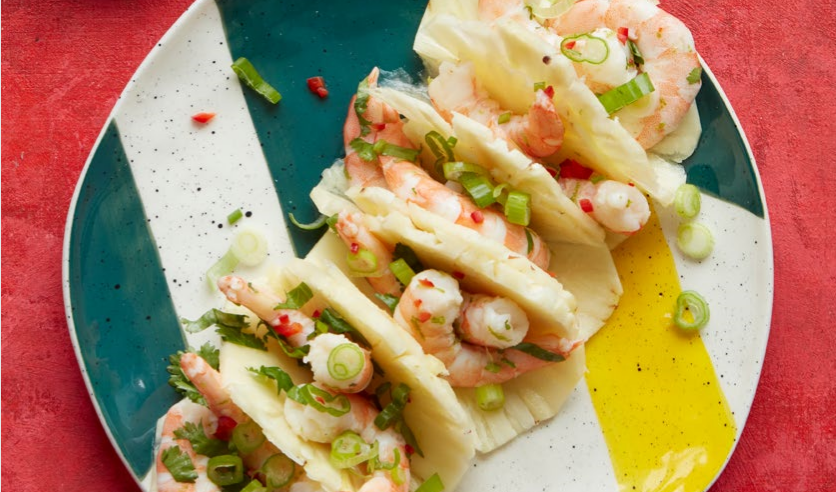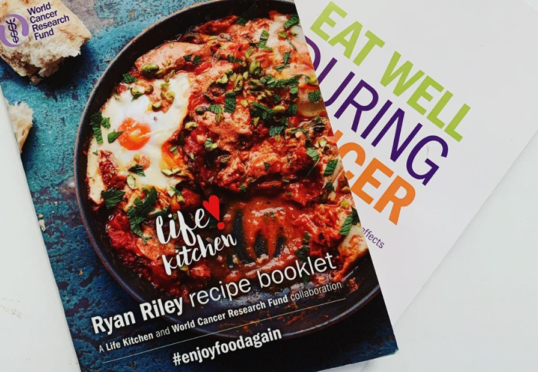Adele Hug, a World Cancer Research Fund oncology dietitian, is on hand to give advice, dispel common myths and put the enjoyment back into meal times.
Eating well during lockdown can be a challenge for a lot of us, with dilemmas about whether to buy fresh, immunity-boosting but perishable ingredients or to stock up on less healthy, longer-life foods to limit shopping trips.
If you’re living with cancer or another serious illnesses, the worry can be even more intense. Not only do you have your diagnosis to grapple with, but also anxiety about making the “right” food choices to help you get better.
With so much contradictory information out there, not all of it coming from reliable sources, there can be a lot of confusion and guilt about eating the “wrong” things.
And to add to the conundrum, cancer can change your sense of taste or make you lose your appetite – so, is it possible to eat healthily while still enjoying your food? And what if you’re unable to get a food delivery slot?
Adele Hug, a World Cancer Research Fund oncology dietitian, is on hand to give advice, dispel common myths about eating well with cancer and to help put the enjoyment back into meal times.
She is teaming up with Ryan Riley, chef and co-founder of non-profit organisation Life Kitchen, to offer free cookery classes on Instagram Live and discuss recipes from his new book aimed at people living with cancer.
“Eating well will mean something different for each person”, she said.
“For many people with cancer, the standard healthy eating advice applies. This means fibre-rich foods like fruit and vegetables, lean meat, fish, pulses, good fats and calcium containing foods like dairy or fortified alternatives. And I would recommend trying to get vitamins from food rather than supplements, with the exception of Vitamin D.
“For others the traditional advice may need to be relaxed to meet their specific needs, when someone has a stoma, for example, when too many fruits and vegetables aren’t the right thing for them.
“There are so many myths about cancer diets. Some people think that if they follow restrictive diets, this will help cure them – for example they believe they should cut out sugar as it feeds cancer cells, or that they should avoid carbohydrates.
“None of this is true and it leads to a lot of anxiety about food. The human body is so much more complex that. If you starve your body of certain food groups you’ll be at much higher risk of malnutrition, so it’s important to eat a balance of foods. The key is moderation.
“In fact, stressing too much about eating unhealthy foods can cause more damage than these foods themselves. There is no need to only eat fresh or organic food either.
Frozen and tinned foods will do just fine and it’s perfectly fine to have ready meals, especially at this time – people with cancer are in the vulnerable category so it’s more important to avoid going out than to worry about buying fresh ingredients.
“I would recommend that cancer patients stay in and get someone else to go to the shop for them. If people are struggling to get food delivered they should speak to their hospital, who will be able to refer them to the appropriate services.”
Adele can offer more personalised advice and answer any individual questions via private Zoom meetings, which will run in conjunction with the Instagram cookery classes.
“I have done two cookery classes, which are on a Tuesday at midday and one Zoom session, on a Monday”, she added.
“The classes and sessions are for anyone at any stage in their cancer diagnosis or treatment, or even for people who don’t have cancer but want to find out more about eating well.
“One of the issues we help with is loss or change of taste, which can happen with particular types of cancer or treatment. For example, a lot of my patients are affected by chemotherapy or radiotherapy, which can cause problem with appetite and taste.
“Neck cancer can also cause taste changes as it can affect the salivary glands. Some people will find they go off certain flavours, or prefer stronger flavours and find most food really bland, or can’t stand strong flavours, and some get a metallic taste in their mouth – it really is very individual.
“I also see people who feel sick during the treatment or have bowel issues. That can make them more anxious about what they eat. If patients are struggling with food they may be more likely to lose weight, including muscle mass, which is a risky path to go down.
The key is to be flexible and try different foods and tastes until you find what works for you and what doesn’t.
“My work is about giving people ideas rather than telling them exactly what to eat – so I will make suggestions for how they can make food taste nicer, while also ensuring they eat protein and energy-rich foods to prevent weight-loss. There’s no general rule, although many people find that citrus flavours can help food taste fresher, for instance.
“For many people the changes in taste only last during treatment, but for some it can take them up to a year to get back to normal, and for some they end up with a new normal, where their sense of taste is permanently altered.”
Adele and Ryan will discuss a different recipe each week from the WCRF and Life Kitchen joint recipe booklet, specifically designed for people living with cancer who experience taste changes.
Ryan’s recipes combine specific ingredients to enhance flavour and viewers are encouraged to cook along at home and ask questions. The recipes all follow WCRF’s healthy eating guidelines, meaning that they are suitable for everyone.
Ryan said: “My mother was diagnosed with small cell lung cancer when she was 45 and sadly passed away two years later. She struggled with losing her taste and enjoyment of food, so I’m thrilled to be working once again with WCRF.
“So please do join us on Instagram – it’s lots of fun but also gives you the opportunity to talk to us directly and ask us any questions you might have. I really hope that these cooking classes will help people rediscover the joys and nutritious benefits of food, particularly during this difficult time.”
To join the cooking class on Tuesdays at 12pm, follow WCRF UK on Instagram at @wcrfuk and Life Kitchen at @lifekitchencookery.
To join the closed group session (Monday midday), you can sign-up here: https://zoom.us/meeting/register/tJUrcuGrpjsuHNIogtVqf7g1-sYp1jZ7kw7Y or email publichealth@wcrf.org
Ryan’s pineapple tacos with prawns, chilli and lime
This simple recipe is packed with goodness while being quick and easy to make.

Ingredients
- 100g cooked cold-water prawns
- 1 red chilli, chopped
- 2 limes, zest and juice
- 1 spring onion, finely chopped
- 1 pineapple, peeled and sliced into thin rounds
- Handful fresh coriander, chopped
Method
1. In a bowl, mix the cooked prawns with the chilli and the zest and juice of 1 lime. Add the spring onion and toss everything together.
2. Fold the pineapple rounds in half to form a ‘taco’ shell and fill with the prawn mixture. Sprinkle over the coriander and finish with a final drizzle of lime. Enjoy!
Top tip: For extra flavour, lightly brown the pineapple under the grill.
